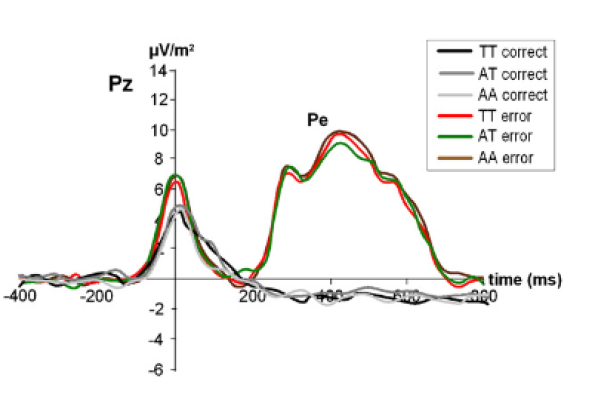2013-01-11

Action control mechanisms are modulated by a number of factors related to neurobiology and affective states like anxiety. However, the precise interrelation of these factors is widely unknown. The neuropeptide S (NPS) system has been suggested to contribute to the pathogenesis of anxiety. In order to further characterize the cognitive-neurophysiological relevance of neuropeptide S in the etiology of anxiety, the influence of a functional neuropeptide S receptor gene (NPSR1) variant on response inhibition and error monitoring was investigated under consideration of the dimensional phenotype of anxiety sensitivity (AS). In a sample of healthy probands, event-related potential (ERP) measurement using a modified Flanker task was applied allowing for a distinct neurophysiological examination of processes related to response inhibition and error monitoring. All subjects were genotyped for the functional NPSR1 A/T (Asn107Ile) variant (rs324981) and characterized for anxiety sensitivity using the Anxiety Sensitivity Index (ASI). Carriers of the NPSR1 T allele displayed intensified response inhibition and error monitoring, which was in both cases paralleled by the behavioral data. Furthermore, anxiety sensitivity was found to be higher in NPSR1 T allele carriers and to correlate with Nogo-P3 and Ne/ERN. A mediation analysis revealed the ERN to mediate the effect between NPSR1 genotype and anxiety sensitivity. In summary, the more active NPSR1 T allele may confer enhanced response inhibition and increased error monitoring and might drive particularly error monitoring as a neurophysiological endophenotype of anxiety as reflected by increased anxiety sensitivity. The study is among the first which is able to directly integrate mechanisms underlying action control with factors of 'anxiety' and 'genetics' into a common framework.

Action control mechanisms are modulated by a number of factors related to neurobiology and affective states like anxiety. However, the precise interrelation of these factors is widely unknown. The neuropeptide S (NPS) system has been suggested to contribute to the pathogenesis of anxiety. In order to further characterize the cognitive-neurophysiological relevance of neuropeptide S in the etiology of anxiety, the influence of a functional neuropeptide S receptor gene (NPSR1) variant on response inhibition and error monitoring was investigated under consideration of the dimensional phenotype of anxiety sensitivity (AS). In a sample of healthy probands, event-related potential (ERP) measurement using a modified Flanker task was applied allowing for a distinct neurophysiological examination of processes related to response inhibition and error monitoring. All subjects were genotyped for the functional NPSR1 A/T (Asn107Ile) variant (rs324981) and characterized for anxiety sensitivity using the Anxiety Sensitivity Index (ASI). Carriers of the NPSR1 T allele displayed intensified response inhibition and error monitoring, which was in both cases paralleled by the behavioral data. Furthermore, anxiety sensitivity was found to be higher in NPSR1 T allele carriers and to correlate with Nogo-P3 and Ne/ERN. A mediation analysis revealed the ERN to mediate the effect between NPSR1 genotype and anxiety sensitivity. In summary, the more active NPSR1 T allele may confer enhanced response inhibition and increased error monitoring and might drive particularly error monitoring as a neurophysiological endophenotype of anxiety as reflected by increased anxiety sensitivity. The study is among the first which is able to directly integrate mechanisms underlying action control with factors of 'anxiety' and 'genetics' into a common framework.